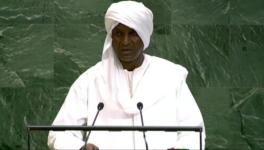Final GST Consensus in COP 28: The Takeaway Points

Image Courtesy: UNESCO
The COP 28 summit in Dubai is nearing its end, and an updated GST text came out early this morning on December 13. After the draft GST (global stocktake), which came on December 11, invited heavy criticism from experts and leaders worldwide, the modified version came this morning. At the time this report was being written, the GST text would have been adopted. At the end of the hottest year on record, the United Nations (UN) climate summit ends where the presence of the oil & gas sector has never been far from the surface.
Few Key Takeaways
-
The text sends clear signs of the end of the fossil fuel era, calling on countries to accelerate the ‘transition away from fossils’ in this critical decade and to set a “net zero” endpoint for 2050. This addresses the requests of all countries. The call to action is also seen as an improvement on the last text. The current text calls on the parties to triple renewable energy by 2030 and doubling energy efficiency. It also recognises that the costs of renewables are falling fast.
-
The text is somewhat stronger on recognising the path to 1.5 degrees Celsius (paras 25-27), with references to emissions peaking at the latest before 2025, required GHG (Greenhouse Gas) and CO2 (Carbon dioxide) emissions reductions in 2030 and 2035, with zeroing on net zero by 2050;
-
However, it still lacks significant input from the Inter-governmental Panel on Climate Change (IPCC) on required emissions reductions in coal, oil and gas, on feasible, effective and low-cost mitigation solutions and on the timeline and required scale of methane emissions reductions.
-
As expected, the text agrees on the tripling of renewable energy and doubling energy efficiency by 2030. However, there is little reference to finance in the text. There are big questions about how the energy transition or adaptation is funded in emerging and vulnerable countries.
-
Among the non-CO2 emissions that require action, only methane emission is singled out. (Previous texts had references to N20 and fluorinated gases).
-
There is no improvement on coal, with the language remaining the same as what was agreed at COP26 in Glasgow. The text references the “Phase down unabated coal”.
-
The text states that Carbon Capture and Storage (CCS) is to be used particularly in the sectors where it is hard to abate rather than across the board.
-
The text references the phase-down of inefficient subsidies except when dealing with energy poverty (first time this is in a global UN text as opposed to just the G20)
-
The text sets out a “Roadmap to Mission 1.5C” on international cooperation ahead of COP30 in Brazil.
How Experts See the Final GST Text:
The adopted GST text is also not free from critical comments from experts. Aarti Khosla, Director of Climate Trends, termed the outcome as positive but “having gaps.” She furthered, “It is the first time that there is recognition of transitioning away from fossil fuels in a COP text. However, coming alongside an absolute recognition of a warming world and the need to take rapid action within this decade, the outcome text ends up making real concessions for gas and oil. The language doesn’t give clarity on whether actual reductions in production and consumption will happen.
“This COP was touted as the one where an evaluation of climate action will be made and marching orders will come for action within this decade. In an effort to please the major emitters, the decision gives a free pass to gas and false solutions by terming them as 'transitional' fuel, regardless of emissions contributions which are modelled to come from gas, especially from countries like Russia, US, Middle East (West Asia),” she opined.
On the issue of financing, Khosla remarked, “With much hype on this COP being a finance COP, there isn't any landmark outcome on finance. The calls for reforms to multilateral financing and for the World Bank to scale up finance through grants and concessional funding is relevant for India.”
Arunabha Ghosh, CEO of the Council on Energy, Environment and Water (CEEW), however, termed the outcomes disappointing. He said, “This COP has largely disappointed on all fronts. It hasn't sufficiently raised climate ambition, held historical polluters accountable, or established effective mechanisms to finance climate resilience and a just low-carbon transition for the Global South.”
Commenting further on the shortcomings of the GST text, Ghosh said, “While the operationalisation of the Loss and Damage fund on the first day marked a noteworthy success, subsequent developments revealed a discordant trajectory. The Global Stocktake's final text lacked the candid acknowledgement of problems and the teeth required to fight them. The exclusive focus on rapidly phasing down unabated coal, as opposed to all fossil fuels, heightens the risk of exacerbating the North-South global divide.”
“Despite the spotlight on fossil fuels, realising a phase-down necessitates a simultaneous robust expansion of renewable energy and climate finance, particularly in emerging economies poised for a green leap. COP28's failure to instate effective financial mechanisms, obliging historical emitters to contribute, jeopardises support for developing nations in meeting their NDCs (Nationally determined contributions). The urgency of the climate crisis demands immediate reforms be made to the COP process to ensure that accountability, implementation, and climate justice become central to all efforts. Otherwise, future COPs risk becoming obsolete,” he commented.
RR Rashmi, Distinguished Fellow, TERI (The Energy Research Institute), highlights some discrepancies, “The decision highlights the need for orderly and just transition in all energy systems, but singles out the need of phasing down unabated coal plants. This tilts it against the developing countries. At the same time, the adaptation targets are all about planning, implementing and monitoring. Nothing about support. Financing decisions are very weak.”
Ulka Kelkar, Executive Director of Climate, World Resources Institute India, highlighting the Indian perspective, said, “From an Indian perspective, this text displays greater parity between coal and other fossil fuels, but it appears to absolve developed countries of the responsibility of phasing out their fossil fuel use “in this critical decade”. In fact, the reference to “transitional fuels” explicitly gives gas-producing countries the licence to sell more gas rather than invest in renewable energy. It also exonerates the developed countries from making up the finance gap so far, though it recognises that the gap in adaptation finance is “widening” and that doubling the current low levels of adaptation finance will be insufficient.”
Get the latest reports & analysis with people's perspective on Protests, movements & deep analytical videos, discussions of the current affairs in your Telegram app. Subscribe to NewsClick's Telegram channel & get Real-Time updates on stories, as they get published on our website.
























